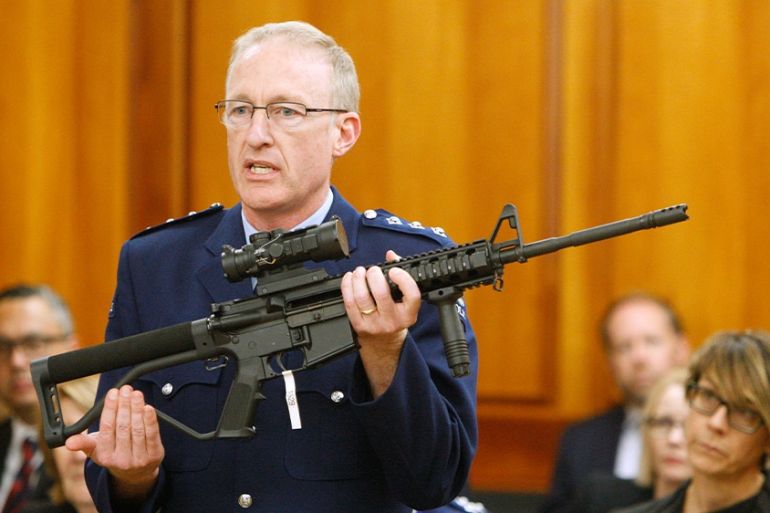New Zealand to end gun buy-back started after mosque shootings
Police say 56,350 weapons had been handed in by Friday morning in a campaign gun-control groups say has been a success.

A scheme to buy back weapons that was launched in New Zealand after the Christchurch mosque attack ends on Friday, with gun-control groups hailing its success despite opposition from some firearms owners.
The March 15 attacks in which 51 Muslim worshippers were killed shocked the normally peaceful South Pacific nation and prompted a swift ban on assault rifles and military-style semi-automatic weapons used by the lone attacker.
Keep reading
list of 3 items‘Hero, role model, beautiful souls’: NZ attack victims
Christchurch attack: Mosque survivor says he forgives gunman
A key element of the ban was a buy-back scheme accompanied by an amnesty, giving gun owners a payment and a guarantee of “no questions asked” when they handed in weapons deemed illegal under new laws.
Police said on Friday that 56,350 firearms and 188,000 parts had been handed in and they were expecting a late rush before the final collection event at 8pm (07:00GMT) on Friday.
|
|
“There will be no extension – anyone prosecuted may lose their firearms licence and could face a penalty of up to five years imprisonment,” police said.
Gun-control advocates say the scheme has succeeded despite opposition from some firearms owners, who they accuse of adopting hardline tactics similar to the US National Rifle Association (NRA).
“Their rhetoric and style of approach very much comes from the NRA,” Gun Control NZ spokeswoman Hera Cook told AFP.
“Everything’s a slippery slope, everything’s a burden on gun owners, there are no compromises that are reasonable.”
The Council of Licenced Firearms Owners (COLFO) estimates there are 170,000 banned firearms in New Zealand, arguing that its data indicates less than a third of the illegal weapons have been collected.
“The scheme is looking like a failure due to the rush on implementing political and ideological remedies, instead of developing a more fair and reasonable hand-in regime,” spokeswoman Nicole McKee said.
But police have provided no official estimate of illegal firearms numbers and Waikato University law professor Andrew Gillespie said there was no way to gauge them accurately.
“I have no idea how they (COLFO) got to this figure, given there’s been no central firearms register since 1982,” he said.
“Estimates of how many firearms are in the country overall are guesswork, with margins of hundreds or thousands either side.”

Regardless of the numbers, University of Sydney gun policy researcher Philip Alpers said the buy-back would result in a safer community.
“No one pretended police would immediately find every one of these guns,” he said.
“But … for each rapid-fire weapon destroyed, you can expect the risk of another mass shooting to decrease.”
‘Unprecedented act’
The buy-back’s completion is not the end of gun reform in New Zealand and the government has already introduced a second tranche of measures to parliament.
They include establishing a firearms registry to track every gun in the country and ensuring only a “fit and proper person” can hold a firearms licence.
The measure will give police the power to exclude anyone promoting “extremism”, convicted of violent crime or with mental health issues, including attempted suicide, from owning a gun.
Gun Control NZ’s Cook said the latest reforms would lead to a long-term change in New Zealand’s firearms culture.
But she warned the government had only a brief window of opportunity to further tighten gun laws before political inertia set in and pro-gun advocates set about watering down reforms.
“A lot of New Zealanders who are not gun owners are complacent and think we’ve solved the problem with the buy-back,” she said.
“They don’t understand how important the legislation currently before parliament is for creating long-term change.”